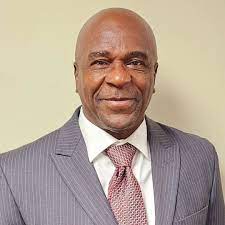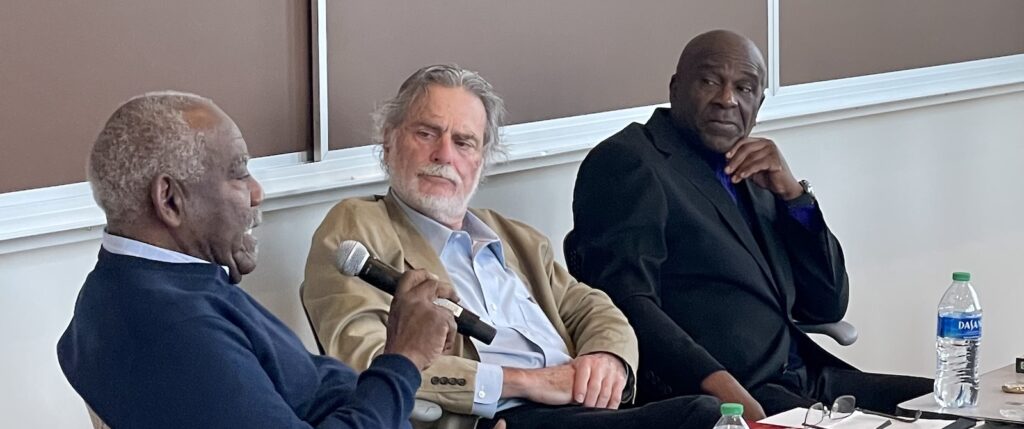CLEAR Hosts Presentation by Dr. Godfrey Vincent, Author of Rebels at the Gates

11.28.23 — George Weekes was one of the most influential figures in the politics and trade union movement of Trinidad from the 1960s. To bring Weekes’ story to life and discuss his impact in Trinidad and beyond, Northeastern Law’s Center for Law, Equity and Race (CLEAR) hosted Dr. Godfrey Vincent, author of Rebels at the Gates: The Oilfields Workers’ Trade Union (OWTU) in the Era of George Weekes, 1962-1987, and a panel of scholars dedicated to the research and organizing of labor movements, on November 17, 2023.
A video of the discussion will be posted to this page later this week.

During an engaging discussion about the actions and effectiveness of Weekes, who served as OWTU president general from 1962 and founder of the United Labour Front (ULF) in 1975, panelists touched on the history of the trade union movement in Trinidad and Tobago, the struggles for workers’ rights in the Caribbean from the 1960s to the 1980s, the decline of trade union density, and lessons this history provides the current US labor movement.
Weekes attacked OWTU’s national leadership for their conservative, pro-company sentiments and undemocratic practices, and was central to the highly successful strike action of 1960, but was unable to turn his union power into political credence against the rising popularity of the People’s National Movement (PNM) under Eric Williams. The trade union movement was also impacted by the economic downturns of the 1980s and the forced privatization of industries by the International Monetary Fund (IMF).
Vincent, associate professor of history at Wilberforce University, said the US labor movement could benefit from the examples set by the Caribbean Radical Tradition. He said “pointers” to take should include creating a participatory democracy; organizing workers not only in their places of employment but “where they live, play and pray;” involvement in community struggle to “address the needs of people of color, women, seniors and gig workers;” and “creating a critique of capitalism as a repressive system.”
Vincent was joined by Matthews Distinguished University Professor of Law Karl E. Klare of Northeastern University School of Law and Professor of Africana Studies Selwyn R. Cudjoe from Wellesley College. The discussion was moderated by Dr. Deborah A. Jackson, managing director for CLEAR.
Cudjoe thanked Vincent for his latest book, adding that it “fills an important gap in history.” Cudjoe spoke about the activity of the 1960s and 1980s as part of a “much deeper Caribbean tradition,” and the “systemic attempts by Caribbean people to shake off imperial shackles.” He said this history can be traced all the way back to the abolition of slavery in 1834 “when [former slaves] dropped their tools and began to bargain with their former masters.”
Klare questioned the US labor movement’s ability to “recast militant activity against exploitation so that episodic struggles leave behind new institutions and new ways of understanding that bring participants together into a democracy.”
Questions from the audience, both online and in-person in Northeastern’s Dockser Hall, concerned community organizing, and the call recently made by Palestinian trade unions for international solidarity and for the US to stop funding Israel.
“We are part of a global working-class struggle,” said Vincent, “and you have to recognize that.”
“The big fight is how we raise consciousness,” said Cudjoe. “We have to see how it ties into the larger struggle, and it all comes down to political activity and political action.”
About Northeastern University School of Law
The nation’s leader in experiential legal education since 1968, Northeastern University School of Law offers the longest-running, most extensive experience-based legal education program in the country. Northeastern guarantees its students unparalleled practical legal work experiences through its signature Cooperative Legal Education Program. More than 1,000 employers worldwide in a wide range of legal, government, nonprofit and business organizations participate in the program. With a focus on social justice and innovation, Northeastern University School of Law blends theory and practice, providing students with a unique set of skills and experiences to successfully practice law.
For more information, contact d.feldman@northeastern.edu